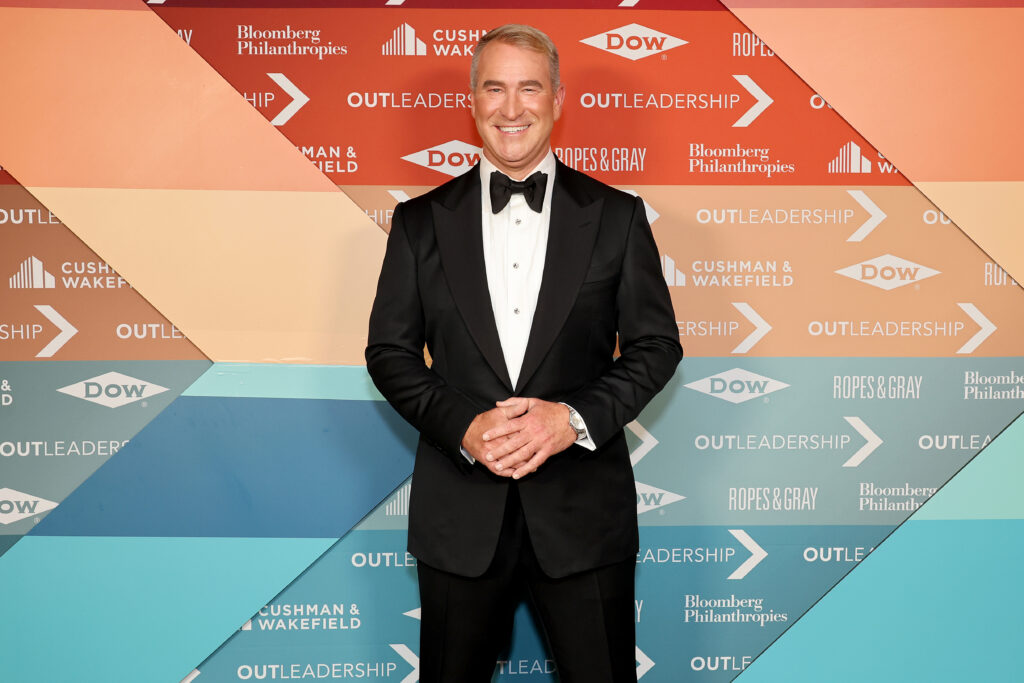Todd Sears sees LGBTQ rights through business and the future looks bright
Todd Sears believes the quickest way to achieve full global LGBTQ equality is through the power of business.
As the founder and CEO of Out Leadership, Sears travels the world to meet with corporate leaders in influential industries to gain support for the LGBTQ+ community, foster business growth, and spread his vision for equality. He once circumnavigated the globe six times in one year. That’s partly how, in 12 years, he has managed to connect with 99 of the world’s most powerful companies—and get them to sign on as Out Leadership members.
As an only child who frequently moved and went to nine different schools before he went to boarding school, Sears says he honed certain skills “starting over every time.” He learned how to walk into any situation with confidence and know how to connect with humans. Gay people, by virtue of being outsiders, often have what he calls an “outvantage.” He has leaned into his outvantage enough to fly to Hong Kong or to Australia 18 and 15 times to build corporate relationships that help us exceed expectations for equal rights that can be set by what he calls the “scarcity model,” or the assumption that we will always be excluded and disadvantaged.
Since October is LGBT History Month and October 11 is National Coming Out Day, I asked Sears how his experience of coming out fed into Out Leadership.
Growing up in North Carolina and knowing he was gay since the age of four, Sears came out to himself at 18, when he came to New York to see Angels In America, the legendary two-part gay history play which he described as a “sledgehammer to the head”—and to the assumption that he would end up a good Southern boy, married with a wife, a picket fence, and 2.2 kids.
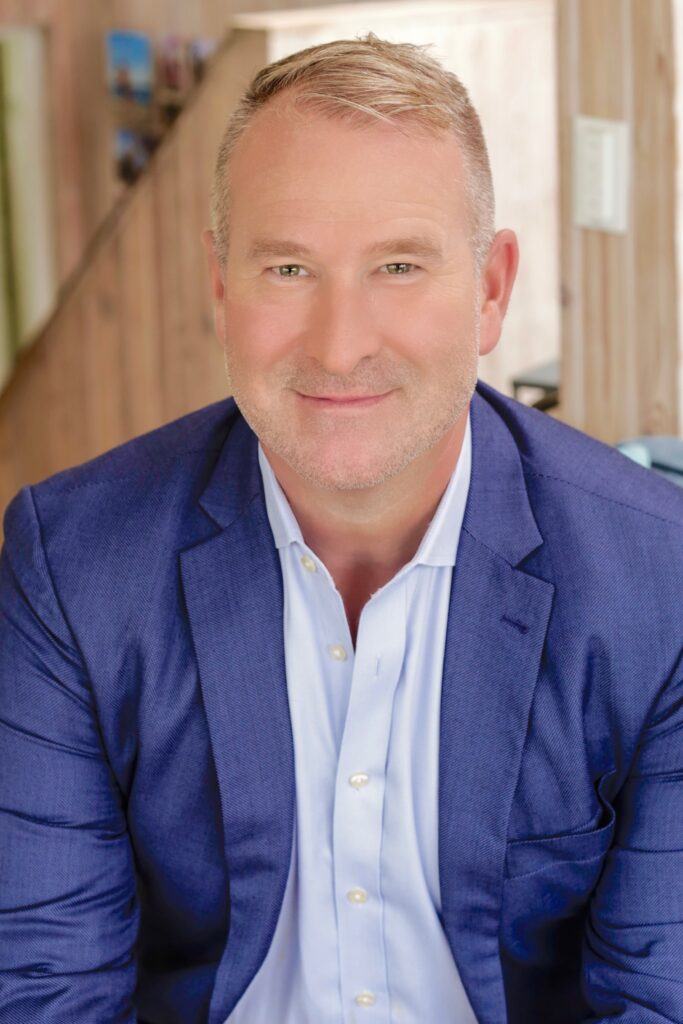
“I ultimately came out to a group of teachers at boarding school, before I graduated. I was the first kid in the school’s 120-year history to ever come out. And I talked about what being gay meant to me and my fear for the school and teen suicide and everything else. And then came home and came out to my parents and my mom had figured it out just because I was sad, and I’m never sad. And my dad didn’t understand it but was supportive… And so then I went to Duke, and I just started coming out individually like this. It was exhausting. I was in a Southern conservative fraternity. I was again the first gay person ever.” Nevertheless, Sears knocked down barriers and flourished at Duke. But New York was tough. At his first investment bank, in his second week on the job, he discovered his boss was a homophobe. “North Carolina was great. And here I am in Wall Street, New York City, and I have a homophobic boss. So I went back to the closet and looked for a new job. And the second bank I was at was a small shop and they were wonderful and it allowed me to start actually winning business from the gay community.”
At investment management company Merrill Lynch where he created the first team of financial advisors on Wall Street focused on the LGBTQ+ community. He pioneered award-winning initiatives as Head of Diversity Strategy at Merrill, and then at Credit Suisse as Head of Diversity and Inclusion. After leaving Wall Street in 2010 with a Credit Suisse severance check, Sears decided to take his skills on the road with a vision to mine equality at the intersection of diversity and business, with the firm belief that equality drives business and business drives equality.
When I spoke to Sears he recalled the first Out On the Street summit in 2011 where he convinced six banks—Bank of America, Barclays, Citi, Deutsche, Goldman Sachs and Morgan Stanley—and he got the then CEO of Deutsche Bank to host it. “And that was important,” says Sears. “This has always been a business-led conversation…because if you have a P&L, you have power in this world. If I can get business leaders to ‘get it,’ then we can make progress.”
After that summit, four of the six CEOs signed on for marriage equality in the state of New York. This was a major leap for Sears, who grew the company from there and launched in Europe, then Asia, Brazil, and Sydney.
Sears has since grown it to almost 700 CEOs globally, and he started a talent accelerator for young gay leaders called OutNEXT with around 9000 leaders worldwide who have gone through that initiative. He started OutWOMEN “because most LGBT things tend to be very male dominated. So I launched it to create space for LGBT women; and Quorum, which is the first and still only global talent program for LGBTQ leadership on boards, trying to get more LGBT people on boards and changing board policies to be LGBT inclusive.”
Recently, Out Leadership announced the first ever ESG (Environmental, Social, Governance) summit focused on meaningful inclusion of LGBTQ+ inclusive diversity into ESG structures and strategies. In the last few years companies have begun to focus on environmental and social impact as drivers of return and good governance—but LGBTQ+ inclusion has been virtually non-existent from this growth.
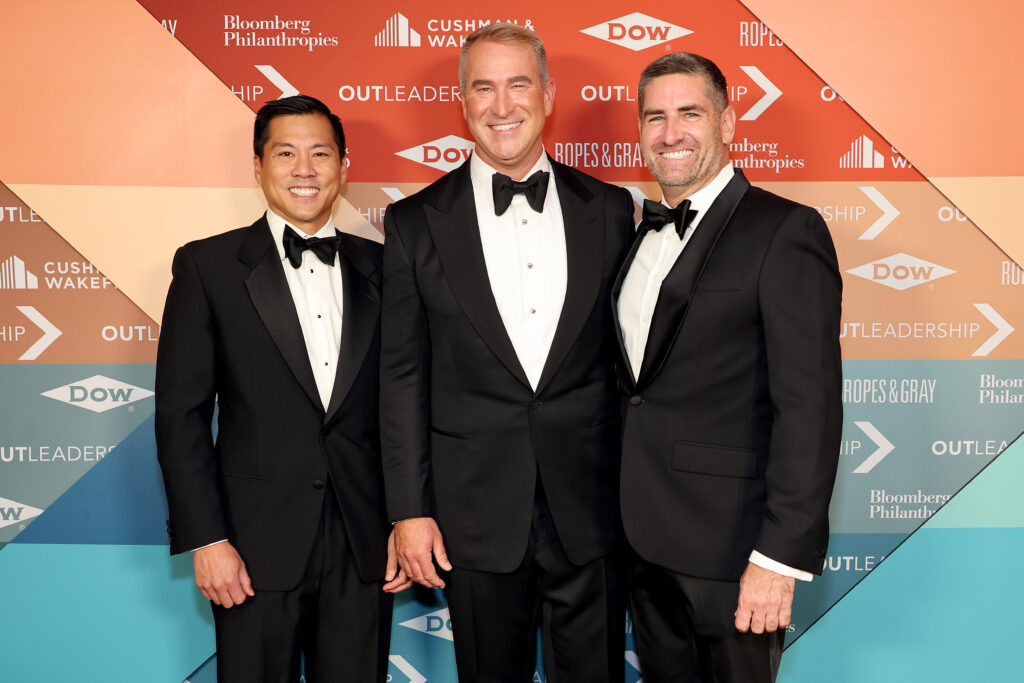
And on September 22, Out Leadership held its big 12th birthday bash, an epic soiree at the aptly-named Rainbow Room in New York City, where Sears was joined by his team, friends, family and supporters who danced the night away in a celebration of his impact. There, Pennsylvania State Representative Brian Sims spoke about Out Leadership’s vital tole to harness the power of business to drive equality in a time when global politics have become “increasingly hostile to LGBTQ people like you and I.”
Sims looked back on the many achievements of Out Leadership in the past decade and highlighted its accelerator for women, OutWOMEN, the first and only business initiative of its kind in the world; its creation of a business statement on trans equality, “the single largest statement for trans rights in history,” according to Sims—who also said that Out Leadership was instrumental in the recent decriminalizing of homosexuality in Singapore. The always charismatic and upbeat Sears had previously participated in a dance number before donning a tux and being introduced by Sims. When Sears took the mic he thanked his his team and noted how far he had come without the usual drumbeat of struggle at LGBTQ events. This was about leadership, especially his brand. “Nobody wants to follow a doom and gloom person,” he explained. “Everybody wants to run towards opportunity. I do think there is opportunity.”
Sears has built Out Leadership as a B Corporation, which is “for profit, for impact,” Sears told me. “So we reinvest our profits in our mission. But then we also donate 20% of our net profits to gay nonprofits. So we’re a true force for good in the world, I think. And it allows us to collaborate with 68 nonprofit partners globally. We’re not competing with them, but we’re bringing them together so that they can do more.”
On the subject of nonprofits, as a longtime activist journalist, I tell Sears that the messaging of my community’s needs has often come from the nonprofit sector. Business corporations have more commonly been portrayed as the enemy, co-opting Pride parades, and rainbow-washing their brands and services during the month of June only. So I ask him to share his thoughts on how and why we should accept that corporations can accelerate what we’re expecting our LGBTQ rights watchdogs to do?
“I’m a pragmatist, first and foremost,” he says, “And I think purity tests are not helpful. And I ask people the question: Do you care about being right as you define it, or do you care about impact and change? And I think too often our community is focused on things that matter but don’t create change. So, for example, we all focus on something someone said that misgendered someone one time and we will eviscerate them and cancel them despite the fact they’ve been supporting our community for 20 years. And I think that’s a massive mistake. I think it does not serve us and I think it will ultimately hurt us.”
And if you think straight white men are obstructionist, Sears shares this anecdote. “The CEO of HSBC Australia, Tony Cripps, has a gay son. And when I launched in Australia, he had a moment. His son had just come out two or three weeks before I went for my first trip. Fast forward a year later, he’s hosting the first gay business summit in Australia with his gay son and his wife at the front table.”
Currently, Sears is “working on the 69 countries where it’s still illegal to be gay because all those countries have business. And all of my companies do business in those countries.”
One of the advantages of looking at LGBTQ rights through the lens of economics is it circumvents the country or state’s politics and religion. “I don’t tell people that their religion is wrong, but I tell people that discrimination is fundamentally bad for business,” says Sears. And this may be one of the reasons why Singapore recently ended its ban on gay sex. Despite being a notoriously conservative nation, it is also a business hub. Can the same be applied to say, America’s South?
“So Florida, for example. The Don’t Say Gay bill, etc. We have data that shows that 26% of LGBTQ people have left anti-gay states in the last two years. That is a brain drain that actually hurts their prospects. These states are sacrificing their economic future to use the LGBT community as a political wedge to solve a problem that doesn’t exist. Trans kids should exist. Trans kids should be able to play sports that match their gender identity.”
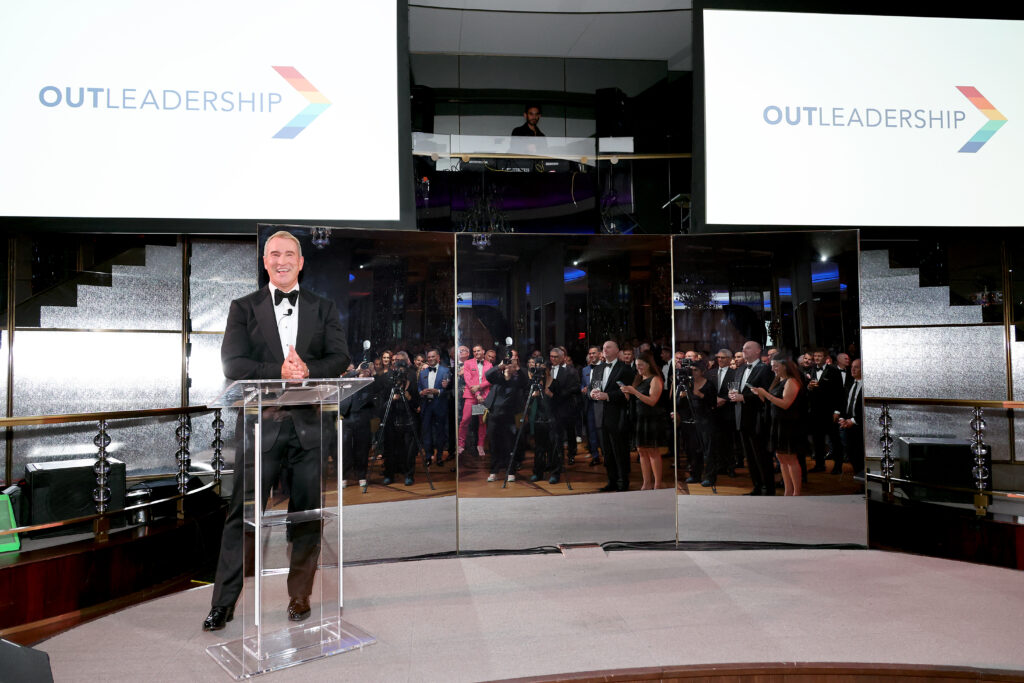
Sears has no problem telling businesses in those states that Out Leadership’s businesses will do less business in anti-LGBT states. Out Leadership publishes a ranked list annually in USA Today, the most-read newspaper in the US, and it ranks every state on 20 different, publicly identifiable data points such as: Is conversion therapy illegal? Is HIV still criminalized? Can trans people have a birth certificate or driver’s license that matches their gender identity? “All of these things that are public information, but aggregating them together and saying, You know what, South Carolina, you’re the worst state in the country, for LGBT people and here’s the proof…”.
It’s not a name and shame list, it’s a climate index he says. This year, Sears had five states reach out to him within two weeks of publication and ask how to be better.
But Out Leadership’s emphasis on business made me think of Pride and the corporatization of Pride parades, especially in New York where floats seem to have become another form of advertising rather than vehicles for minority causes and representation. I ask Sears for his thoughts on this.
“People who say corporations should exit Pride have no idea that we would not have won marriage equality in this country; trans people would not have nearly the rights they have in this country without corporations; 333 companies signed marriage equality briefs in the Supreme Court. That is why the Supreme Court listened. That was not something HRC did. Freedom to Marry did a huge job—Evan Wolfson—state by state. But it was once the business community stood up, and Williams Institute data showing the economic impact of marriage and the economic cost of discrimination…those were the arguments that won the day—and it was also about love. But the corporations did that. Now, pink washing is different, and that’s the nuance that gets lost. There’s a difference in companies slapping a rainbow logo on once a year versus the companies that have been with us and funded our movement and used their platforms to help us.”
I mention that Citi is extending its chosen name offering to cardholders and Sears reminds me that it began with Mastercard’s True Name feature, which lets cardholders with participating banks use their true first name on their card without requiring a legal name change. “Those corporates who are helping trans people have a credit card for the first time ever—they shouldn’t be allowed in our parade? It’s illogical.”
I wonder what’s more illogical: excluding corporations from Pride or expecting rights organizations and nonprofits to do the heavy lifting by themselves, year in and year out. To this extent, Sears’ positive mindset—one which drove him at the age of 33 to take his severance check and start Out Leadership—is a refreshing brand of activism.
“I’m setting a ten year ambition for the gay community,” he tells me. “In ten years I would like three things to happen. Business, talent, equality are my pillars for leadership. In that order. It has to be a business conversation. We have to have supported LGBT talent to have equality. On the business front I want LGBT equality baked into business practices globally, and ESG is one of the ways that we’re going to do that. By virtue of doing business, companies have to have LGBT equality in mind and part of how they just do business. On the talent front, I want the entire talent lifecycle to be under Out Leadership in some way supported. So we’re identifying developing gay leaders from high school through board. And then on the equality front I want those two pieces to help remove structural barriers to equality, i.e. sodomy laws in 69 countries and anti-trans laws all over the world. I want all of those to be removed by virtue of the power of business, and that’s my goal.”
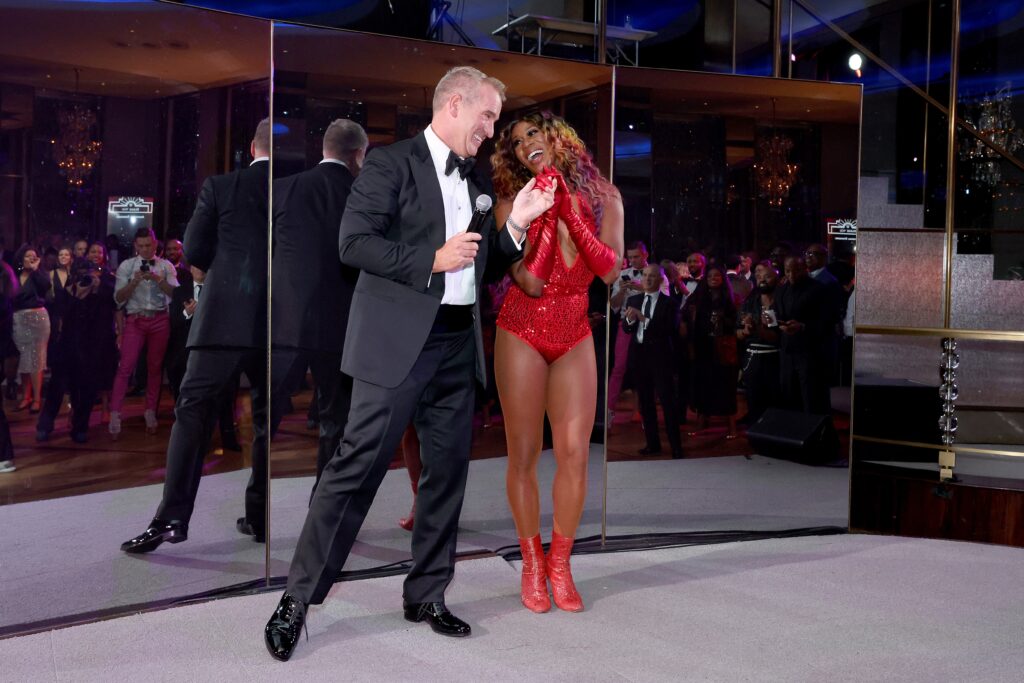
That is a very high-minded goal. To test Sears’ optimism in the current climate I ask him if he thinks marriage equality will be repealed in the US.
“I do not think it will. I mean… the world has changed. The world has moved on. Jerry Falwell’s like, The world’s going to end and the locusts and the plagues and the floods—none of that came to pass. What did come to pass were all the things the Williams Institute said would happen: Economic progress in the states that had marriage equality. All that did come true and they actually underestimated, interestingly.”
Which is not to say other rights which may be seen by Republicans as an overstretch could not be repealed. But this is where business comes in, according to Sears. “The business community says, Hey, wait a minute, if you undo marriage equality that’s going to create hundreds of millions of dollars of cost for us, because we have to go back to understanding which state laws, economic cost, difference in taxation, etc, etc. The moral case is subjective, that’s very hard to argue consistently, but the business case is quite easy because people want their employees to be happy. And by the way, straight people have gay kids and straight people, the ones running these organizations, we have allies we never had 25 years ago because people have come out. I get senior leaders that have trans and gender nonconforming kids who come to me and ask for help. And they become the fiercest allies.
“I am the eternal optimist, if you haven’t picked up. I really do think this will all be fine.”
Visit Out Leadership here.


